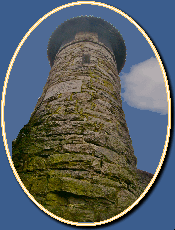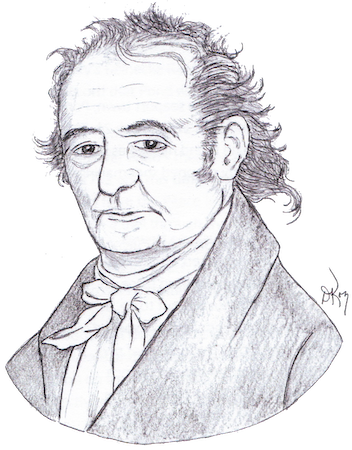prominent sheriff; judge, lieutenant governor & governor
Charles Hobby Pond is part of a distinguished Milford family line. His uncle, Peter Pond, was a famous explorer of Canada. His father, Charles Pond, was a fearless sea captain during the Revolutionary War who transported Nathan Hale from Norwalk to Huntington, Long Island for his ill-fated spying expedition against the British.
He was born in Milford April 26, 1781 and grew into a large muscular youth with a keen mind. He entered Yale University at age 17 and graduated in 1802. He studied law for two years and was admitted to the Fairfield County Bar but ill health overtook him and he never practiced. All that is explained about his ill health is that he contracted it “by bathing when in a heated condition and he was ever after lame,” according to the genealogy “The Ponds of Milford, Connecticut” written by his nephew, Nathan Gillett Pond. The family determined he could regain some of his health by taking an extended voyage on one of his father’s merchant ships. The trip worked out so well that he followed the sea for several years, shipping first as “supercargo” and later as captain.
Eventually quitting the sea, he took up politics and had a fast rise to prominence. In 1819 he was appointed a judge of the Court of New Haven County. In 1820 he was elected sheriff an office he held until 1834. Then he became an associate judge of the New Haven County Court in 1836 and 1837. Pond was elected lieutenant governor of Connecticut in 1850, 1852 and 1853.
During his last term as lieutenant governor, Pond assumed the duties of governor for seven months when Governor Thomas H. Seymour resigned from office to become ambassador to Russia. During his tenure, the U.S. Senate passed the Kansas-Nebraska Act, which caused great controversy throughout the state. The Bill made slavery legally possible in a vast new area and revived a bitter quarrel over the expansion of slavery, which had died down after the Compromise of 1850. It hastened the start of the Civil War. As for his own position, Pond was in sympathy with the pro-slavery Democrats up to the time of his death. He did not seek re-election as governor and retired from public service.
Regarding his personal life, he outlived his whole family including his wife, Martha, six daughters and a son, Charles, who died while a student at Yale on June 9, 1828. He died in the same house where he was born April 26, 1861, the same month the Civil War started, and is buried in Milford Cemetery. As Nathan G. Pond said in his genealogy, the governor was “the only Pond of Milford who reached manhood and died under the roof where he first saw light.” Today a small plaque marks the former location of the house in front of 69 Broad Street.
A prominent man who knew Governor Pond said: “He was a man more deeply versed in the political history of the country than any other within the circle of his acquaintance. His talents were of the very first order, and his pen – whenever he wielded it – was marked by the reflection of a powerful mind, and purest patriotism. No man was wiser in council – none more devoted to the true and lasting interests of his country. His intellectual strength, his genial and generous heart, his true and steady friendship, and ready wit, made him the favorite of every circle, whether old or young.”



